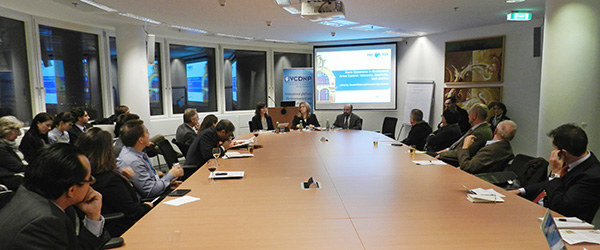
On 11 November, 2013, the Vienna Center for Disarmament and Non-Proliferation (VCDNP) hosted the launch of a new book, Norm Dynamics in Multilateral Arms Control: Interest, Conflicts, and Justice, edited by Dr. Harald Müller and Carmen Wunderlich of the Peace Research Institute Frankfurt (PRIF). The book, published by the University of Georgia Press in April 2013, analyzes the complex dynamics underlying the evolution of multilateral arms control regimes.

Carmen Wunderlich provided an overview of the book's research design and structure. She explained that it was a result of a multiyear research project to better understand the sources, dynamics, and evolution of the international norms that underlie multilateral arms control regimes. The authors identified four sources of the evolution of norms: norms entrepreneurs (individual states or groups of states, international organizations, non-state actors), intra-regime conflicts, exogenous events, and technological advancement. The impact of these sources is further modulated by competing interpretations of the notion of "justice." The study analyzes a broad variety of sources, both primary and secondary, as well as interviews with experts and government officials, participatory observation, and process tracing. It specifically addresses regimes regulating weapons of mass destruction (WMD) and humanitarian arms control regimes related to antipersonnel mines, light weapons, and cluster munitions.

Dr. Harald Müller, outlining the main finding of the study, noted that the evolution of norms is inevitable. While this evolution, in most cases, comes from within the regime itself and is implemented in accordance with the procedures defined by the relevant treaty, in many cases this change is triggered by decisions made outside that framework by a variety of actors, such as the United Nations Security Council, other institutions and organizations—such as the Nuclear Suppliers Group, the Zangger Committee, or the Proliferation Security Initiative,—as well as by non-state actors. The book highlights the key role of norm entrepreneurs in driving the evolution of regimes and classifies them into three groups of actors: "bridge builders" (nongovernmental organizations, the EU, the United Nations, the Middle Powers Initiative, South Africa), "determined critics" (states such as Iran or Egypt), and "conventional interest-driven actors" (great powers, North Korea).
Similarly, exogenous events—such as shifts in power balance, wars, or terrorist attacks—can have a profound impact on the evolution of existing, or the creation of new, norms.
Among the book's important findings is the conclusion that, contrary to common belief, the terrorist attacks on 11 September 2001 did not have a major impact on the evolution of non-proliferation and arms control regimes. Rather, specific measures were introduced to existing regimes, which otherwise demonstrated a considerable degree of robustness. Similarly, shifts in the global balance of power that have taken place in the past two decades affected existing regimes only marginally. The significant evolution of these regimes can be instead attributed to both the desire of many actors to utilize new opportunities offered by the end of the Cold War as well as the emergence of new challenges (such as the discovery of WMD programs in Iraq in the early 1990s).
Dr. Müller discussed in detail the role of technological developments in the evolution of arms control norms. He explained that technological advancements alter the premises on which norms were originally established. Change in technology can have three types of consequences for international regimes: it can create new threats and challenges (including opportunities to violate or circumvent regimes), new opportunities (such as new verification tools and new barriers to potential violators), and also temporarily enhance the gaps between the "haves" and the "have nots," which can exacerbate conflicts over technology assistance and cooperation issues.

Finally, Dr. Müller outlined the impact of competing notions of justice on the evolution of norms. Conflicts over distributive justice (the right of developing states to receive assistance and peaceful uses of technologies) can be seen in all multilateral arms control regimes. Specifically, these conflicts arise over the appropriate measures of such cooperation, the weight of justice norms vis-à-vis non-proliferation norms, the relative weight of justice vis-à-vis market principles, and procedural issues (in particular, the exclusion of potential recipients of assistance from export control "clubs"). Although often dismissed as rhetoric and accorded low status when related to security policy, justice plays a key role in shaping norms over time. The fulfillment of justice claims by negotiating parties leads to steady and long lasting agreement. Conversely, the denial of justice claims fuels hostility and mutual mistrust, ultimately presenting an impediment to cooperation and the survival of arms control and non-proliferation regimes.
Harald Müller is executive director of the Peace Research Institute Frankfurt (PRIF) and professor of international relations at Goethe University, Frankfurt.
Carmen Wunderlich is a research associate at PRIF and PhD student at Frankfurt University.

By continuing to use the site, you agree to the use of cookies. more information
The cookie settings on this website are set to "allow cookies" to give you the best browsing experience possible. If you continue to use this website without changing your cookie settings or you click "Accept" below then you are consenting to this.